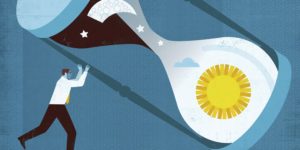Living out of sync with the rest of the world may be to blame
by Maggie Fox and Erika Edwards /
The stress of night owls trying to live against their nature could be a factor in their increased risk of dying over a given period of time.Luciano Lozano / Getty Images/Ikon Images
Are you a night owl? It might be killing you, researchers reported Thursday.
They found people with naturally late body clocks were about 10 percent more likely to die over a given period than early birds who rise with the sun.
It’s probably because living in a world geared for early starts is throwing off the circadian rhythms of the night owls, the researchers said.
Their findings fit in with other reports that show people who stay up later at night have higher risks of diabetes, high blood pressure and some types of cancer.
The researchers looked at surveys of more than 400,000 people taking part in a large British study of genes and health. As part of a detailed questionnaire, they were asked whether they tended to be night owls or morning larks.
There wasn’t much difference among people who fell in the middle. But there was a notable difference between the two extremes, said Kristen Knutson, associate professor of neurology at Northwestern University Feinberg School of Medicine.
“We found that the night owls had a 10 percent increased risk of dying over about a six and a half year period. And that was even after we took into account things like existing health problems,” Knutson told NBC News.
It’s not a lack of sleep — both groups got about the same amount, Knutson and her colleague Malcolm von Schantz, a professor of chronobiology at the University of Surrey, reported in the journal Chronobiology International.
“I think the problem arises because a night owl is trying to live in a morning lark world,” Knutson said. “If the body is expecting you to do something at a certain time like sleep or eat and you’re doing it at the quote ‘wrong’ time, then your body’s physiology may not be working as well.”
Researchers know the body clock is important. Three scientists who study the body’s internal clock won the Nobel Prize in Medicine last year. Their work, done over decades, helps explain how life adapts to the 24-hour cycle of day, and also how diseases such as cancer arise in the cells.
Studies indicate that switches to and from daylight savings time can raise the immediate risk of death over the following days, and others show the health risks of shift work.
The International Agency for Research on Cancer, an arm of the World Health Organization, says shift work probably causes cancer. It’s linked with breast cancer and other types of cancers, as well as diabetes and sleep disruption.
Those studies support the idea that working against the body’s natural inclination can be hazardous to your health.
Knutson and Von Schantz looked at how people answered the early bird question. “Approximately, 27 percent identified as definite morning types, 35 percent as moderate morning types, 28 percent as moderate evening types and 9 percent as definite evening types,” they wrote.
It was the 9 percent of people who said they were “definite” evening types who had the 10 percent increase risk of dying from something over the next six or so years.
“Neither of the two intermediate groups was associated with increased risk of all cause mortality,” they added.
There could be many reasons. People who stay up later eat fattier foods, drink more alcohol and are more likely to use recreational drugs. They have more exposure to artificial light, as well.
“Greater eveningness has also been associated with depression and mood disorders, particularly in those 50 years or older,” the researchers added.
But the stress of trying to live against their natures could be at fault, they proposed.
“The health of evening types could be compromised by misalignment between their endogenous biological clocks and the timing of social activities (e.g. work or meals), termed circadian misalignment,” they wrote.
WHAT CAN PEOPLE DO?
“You can’t just suddenly go to bed three hours earlier tonight because it won’t work,” Knutson said.
Confirmed night owls must make sure to eat a healthy diet and exercise regularly, she said.
But society should also recognize that some people have a genetic tendency to sleep later.
“If we can recognize these chronotypes are, in part, genetically determined and not just a character flaw, jobs and work hours could have more flexibility for owls,” Knutson said.
“This is a public health issue that can no longer be ignored,” von Schantz added.
“We should discuss allowing evening types to start and finish work later, where practical. And we need more research about how we can help evening types cope with the higher effort of keeping their body clock in synchrony with sun time.”

